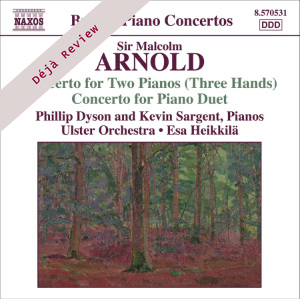
Déjà Review: this review was first published in December 2007 and the recording is still available.
Sir Malcolm Arnold (1921-2006)
Beckus the Dandipratt overture op.12 (1945)
Fantasy on a Theme of John Field, op.116 (1975)
Concerto for two pianos (three hands) (‘Concerto for Cyril and Phyllis’), op.104 (1969)
Concerto for piano duet and strings, op.32 (1951)
Phillip Dyson (piano), Kevin Sargent (second pianist)
Ulster Orchestra/Esa Heikkilä
rec. 1997; Ulster Hall, Belfast, UK
Naxos 8.570531 [67]
Thanks to the enterprise of several recording companies, the past fifteen years or so have introduced the public to the full glory of the output of Malcolm Arnold. No longer is he seen as a kind of musical buffoon, churning out light pieces, dances and comedy overtures, but as a symphonist of great stature and a master of chamber music. Indeed, we are now lucky enough to have three complete recordings of his nine Symphonies (Handley on Conifer, now Decca, Hickox and Gamba on Chandos and Andrew Penny on Naxos), and two sets of his chamber music on Hyperion and Naxos. This new disk gives us two examples of the light and two of the serious sides of Arnold’s art, and most welcome it is, too.
Beckus the Dandipratt was Arnold’s first success, written whilst he was still a trumpeter with the London Philharmonic, and recorded by that ensemble under the conductorship of Eduard van Beinum in 1948. It’s a riot of a piece, though not without its moments of dark respite, in which the Dandipratt – an old English name for an urchin – emerges triumphant; a kind of English Till Eulenspiegel without the tragic ending. Brilliantly orchestrated, it makes a magnificent start to this recording.
Chronologically, the next work is the Concerto for piano duet, written in the wake of the first set of English Dances. Whilst there is much music for piano duet, concertos for four hands at one piano are rare – Gordon Jacob wrote a very attractive one for Cyril Smith and Phyllis Sellick in 1969. This music is passionate and owes something to the fact that Arnold had recently spent three and a half months in Springfield Hospital, following a psychotic episode; so often the breakdown in Arnold’s health is reflected in his music. The outer movements of this concerto are swift and, in general, easy-going, whilst the central slow movement is a passacaglia, really a set of seven variations, which culminates in a jazzy dance.
The Concerto for two pianos (three hands), originally called Concerto for Cyril and Phyllis, was a Proms commission – Arnold’s penultimate major BBC commission – and is a real crowd-pleaser. A portentous opening movement is full of bell sounds, but with its tongue firmly in its cheek. It is followed by a real winner of a slow movement containing one of those “pop” tunes Arnold could write when he wanted to. The finale is an unruly rumba, which at the premiere, brought about a five minute ovation and was repeated as an encore. This is Arnold in both his manic and depressive moods … but what music! A recording of the première was issued by the BBC in a 2 CD set (long deleted) made up of live performances of Arnold conducting his own music, celebrating Arnold’s 75th birthday and is indispensable for anyone interested in his music (BBC Radio Classics 15656 91817)
Hugo Cole writes (Malcolm Arnold, ‘An Introduction to his Music’, Faber 1989) that the Fantasy on a Theme of John Field “… remains one of the most disturbing of Arnold’s works …” and it is a difficult work to listen to, for it jumps from idea to idea, violent to wistful, melancholic to comedy chase music. What are we to make of it? On one level it’s a set of variations, but a far from straightforward set, on another it’s an all-out battle between piano and orchestra and between Arnold and Field. Written not long after the dark 7th Symphony and the overtly populist 2nd Clarinet Concerto, the Fantasy employs elements of both, but it is the dark side which informs the work. Poor John Field, the man could never have expected such an assault on his work, but what a work it is. Cole sums the work up as “…offering the listener no clues as to the ways in which (rationally or emotionally) its message should be interpreted.” Very true, but thanks to this recorded performance we can return to the music often and, getting to know it, come to appreciate it as a distant relation of the romantic piano concerto – which, surely, is what it is.
Apart from a moment of confusion from the orchestra at the close of the Concerto for two pianos (why wasn’t this retaken?) this is a fine disc with well thought out, and well played, performances of some very interesting music missing from our concert halls. Phillip Dyson is the virtuoso soloist in the Fantasy, more than ably partnered by Kevin Sargent in the Concertos. The recorded sound is bright and clear placing the performers in a true concert hall setting. A valuable addition to Naxos’s growing catalogue of Arnold recordings.
Bob Briggs
Buying this recording via a link below generates revenue for MWI, which helps the site remain free



















